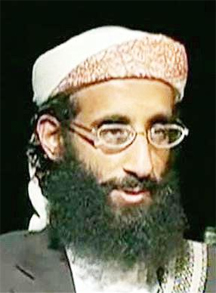WASHINGTON, (Reuters) -The killing of Anwar al-Awlaki in Yemen yesterday by a U.S. drone strike is the culmination of two years of extensive U.S. efforts to track down the American-born member of al Qaeda and put him out of action.

Awlaki, identified by U.S. intelligence as “chief of external operations” for al Qaeda’s Yemen branch and a Web-savvy propagandist for the Islamist cause, was killed in an attack by missiles fired from multiple CIA drones in a remote Yemeni town, U.S. officials said.
Among three other people killed in the attack, a U.S. official said, was Samir Khan, another American who turned to militancy and served as editor of “Inspire,” a glossy magazine used as a propaganda and recruitment vehicle by al Qaeda in the Arabian Peninsula (AQAP). The Yemen-based group is deemed by U.S. officials to be one of al Qaeda’s most dangerous offshoots.
A U.S. official described the other two people killed in the attack as “unidentified associates” of Awlaki and Khan.
President Barack Obama hailed the Awlaki strike as “another significant milestone” in efforts to defeat al Qaeda and proof that it and its allies will find no safe haven. “The death of Awlaki is a major blow to al Qaeda’s most active operational affiliate,” Obama said.
U.S. officials said that Awlaki had been a subject of intense interest from American and other counter-terrorism agencies at least since late 2009, when he was implicated in two serious incidents directed at American targets.
An official said that Awlaki and AQAP also were responsible for “numerous terrorist attacks” in Yemen and nearby countries in which “scores of Muslims” died. A European official said Awlaki was also implicated in at least two British counter-terrorism investigations, one of which involved an employee of British Airways.
A U.S. official said that despite extensive and continuing civil turmoil in Yemen, “The Yemeni government’s counterterrorism program has remained strong.” Other U.S. officials said that during the last several years in which political disorder has reigned, the U.S. has stepped up unilateral efforts to collect intelligence and conduct counter-terrorism operations in Yemen.
The officials spoke on condition of anonymity to discuss intelligence matters.
The U.S. now has access to facilities in nearby countries including Saudi Arabia, Djibouti and the Seychelles from which it can launch drones and ground-based intelligence and counter-terrorism operations, a U.S. official said. This helps explain why U.S. intelligence collection efforts in Yemen have remained productive despite political upheaval there.
U.S. forces had conducted at least two earlier operations against Awlaki in Yemen, including an unsuccessful drone attack four days after the May 1 raid during which U.S. commandos killed al Qaeda founder Osama bin Laden at his hide-out in Pakistan.
“This was a terrorist who wasn’t simply a propagandist, but over the years had become an operational figure who was increasingly focused on planning and carrying out attacks against the United States and our allies,” a senior U.S. defense official said. “A very bad man just had a very bad day.”
“GLOBAL TERRORIST”
The U.S. government branded Awlaki a “global terrorist” last year. He had earlier been targeted by U.S. forces authorized to kill him because of what Washington believed was the role he played in radicalizing English-speaking Muslims and because of his alleged role in plots to attack U.S. targets. Awlaki was implicated in at least two major U.S. incidents in 2009. Following the shooting attack on soldiers at Ft. Hood, Texas, in which U.S. Army psychiatrist Nidal Malik Hasan has been charged, investigators found evidence that Hasan had been in e-mail contact with Awlaki.






